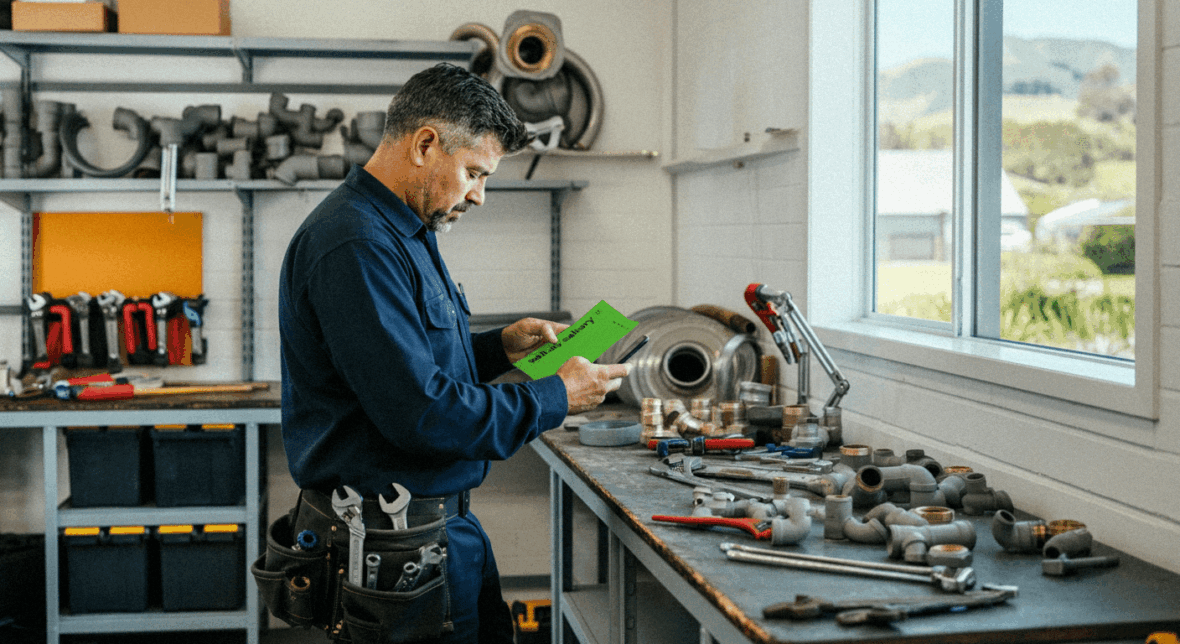Plumbers in the United States deliver essential services by establishing and servicing piping networks to distribute water gas and waste management systems across residential buildings, commercial facilities, and industrial facilities. Plumbing experts work together to provide secure operations, enhancing public health and safety standards.
Salaries by Experience Level
Plumbers, pipefitters, and steamfitters receive an average salary of $61,550, according to the Bureau of Labour Statistics as of May 2023, and various trusted sources provide compensation ranges for 2025 at the following levels:
- Entry-Level Plumbers (0-2 years): $40,000 – $50,000 annually.
- Mid-Level Plumbers (3-7 years): $55,000- $70,000 annually.
- Experienced Plumbers (8+ years): $75,000 – $90,000 annually.
- Master Plumbers: Over $103,140
Plumbers Salary Trends and Regional Variations
| City | Average Annual Salary |
| San Jose, CA | $81,336 |
| San Francisco, CA | $81,012 |
| Oakland, CA | $79,068 |
| New York, NY | $75,698 |
| Queens Village, NY | $75,180 |
| Paramus, NJ | $74,661 |
| Passaic, NJ | $74,596 |
| Bergenfield, NJ | $74,531 |
| Stamford, CT | $74,402 |
| Huntington, NY | $73,883 |
Factors Influencing Plumbers Salaries
Several factors impact plumber salaries:
- Experience Level: Advancing from apprentice to journeyperson to master plumber leads to higher pay.
- Certifications: Specialisations in gas fitting or green plumbing can increase earnings.
- Location: Urban centers and states with high construction activity often offer higher salaries.
- Employer Type: Large construction firms or government agencies may provide better pay and benefits.
Job Duties
Plumbing job duties for professionals in the USA include the following activities:
- They install and repair water, gas, and drainage system pipes, fixtures, and appliances.
- The plumber needs to detect leaks and blockages by examining system failures using specialized equipment.
- The work must follow all safety rules and regulations, such as those provided by OSHA.
- They must work jointly with contractors and clients to create and execute plumbing solutions during the project development process.
Educational Pathway to Become a Plumber in the USA
- High School Diploma or GED: The profession demands applicants to obtain a high school diploma or equivalent. A high school diploma or GED includes algebra, geometry, physics, and drafting classes as practical electives for students.
- Formal Training or Apprenticeship: New plumbers typically discover their careers through apprenticeships, which consist of four to five years of on-the-job training at worksites. Apprenticeships provide comprehensive training through workplace experiences and classroom learning that unions, trade schools, and plumbing businesses deliver.
- Licensure: A state license becomes obtainable for plumbers only after they graduate from their apprenticeship and pass the standard licensing exam created by their specific state. Applicants need to fulfill different requirements in each state through work experience supported by knowledge of building regulations and codes.
Skills Required for Plumbers
- Technical Skills
- Plumbing fundamentals: Install/maintain water systems and fire safety systems.
- Specialized techniques: Soldering, pipefitting, drain cleaning (snakes, hydro-jetting).
- Tool proficiency: Operate hand/power tools, sewer cameras, and line locators.
- Diagnose leaks, clogs, and system failures.
- Apply logical reasoning to solve unexpected challenges.
- Strength/flexibility: Work in tight spaces and handle heavy equipment.
- Fine motor skills: Precision with small tools/parts.
- Understand plumbing codes, safety standards, and scientific principles (e.g., water pressure).
- Apply maths for calculations and measurements.
- Explain technical issues to clients.
- Coordinate with contractors and handle customer concerns professionally.
- Use software for invoicing, time management, and record-keeping.
- Follow safety protocols and interpret MSDS for hazardous materials.
To succeed, plumbers must balance technical expertise, physical stamina, and customer-facing skills.
Overview of Plumbing Apprenticeships
Salary for plumber apprentice
Apprentice plumbers earn while they learn, with salaries varying by location. They typically earn 40–60% of a journeyman’s wage, with incremental increases as they gain experience.
Most states mandate licensing for plumbers, though requirements vary. The BLS notes that apprenticeships (typically 4–5 years) and certifications (e.g., EPA Section 608 for refrigeration systems) are common pathways to licensure.
Key Responsibilities
The duties of plumbing apprentices support their licensed supervisor with plumbing system installation and repair work and routine maintenance activities., including:
- Pipe assembly and repair: Plumbers must install and fix pipes through their work of pipe making, soldering, and pipe connection applications for water distribution, gas pipelines, and drainage systems.
- Fixture installation: Sinks, toilets, faucets, and fire safety systems (e.g., sprinklers).
- Troubleshooting: The apprentice must evaluate system failures and diagnose leakages and clogs during troubleshooting activities.
- Job site management: The apprentice performs job site duties by cleaning work areas, moving tools, and creating cost arrangements.
- Code compliance: Water and gas pipe assembly and furniture installation require following all state, federal, and municipal plumbing regulations.
Prerequisites to Become a Plumbing Apprentice in the USA
- Age Requirement: Candidates must meet the age criteria of 18 years or older.
- Education: High school diploma or GED.
- Physical Fitness: Performing manual labor represents one of the requirements for physical fitness.
- Drug Test and Background Check: These are required by many programs.
- Entrance Exam: A few plumbing apprenticeship programs require participants to pass basic quizzes on math skills and reading comprehension.
- Application Process: Complete an application for a union, trade school, or employer offering apprenticeship programs.
Due to infrastructure development and population expansion, plumbing job opportunities are expected to last until 2032. Plumbing is a financially rewarding and reliable career choice across the United States, mainly because of work experience, job location, and professional certifications. Individuals can enter the plumbing occupation through apprenticeships, combining practical skills training with consistent salary raises. The expansion of infrastructure and rising population numbers contribute to increased demand for skilled tradespeople, guaranteeing reliable employment and attractive compensation in multiple geographic areas.
